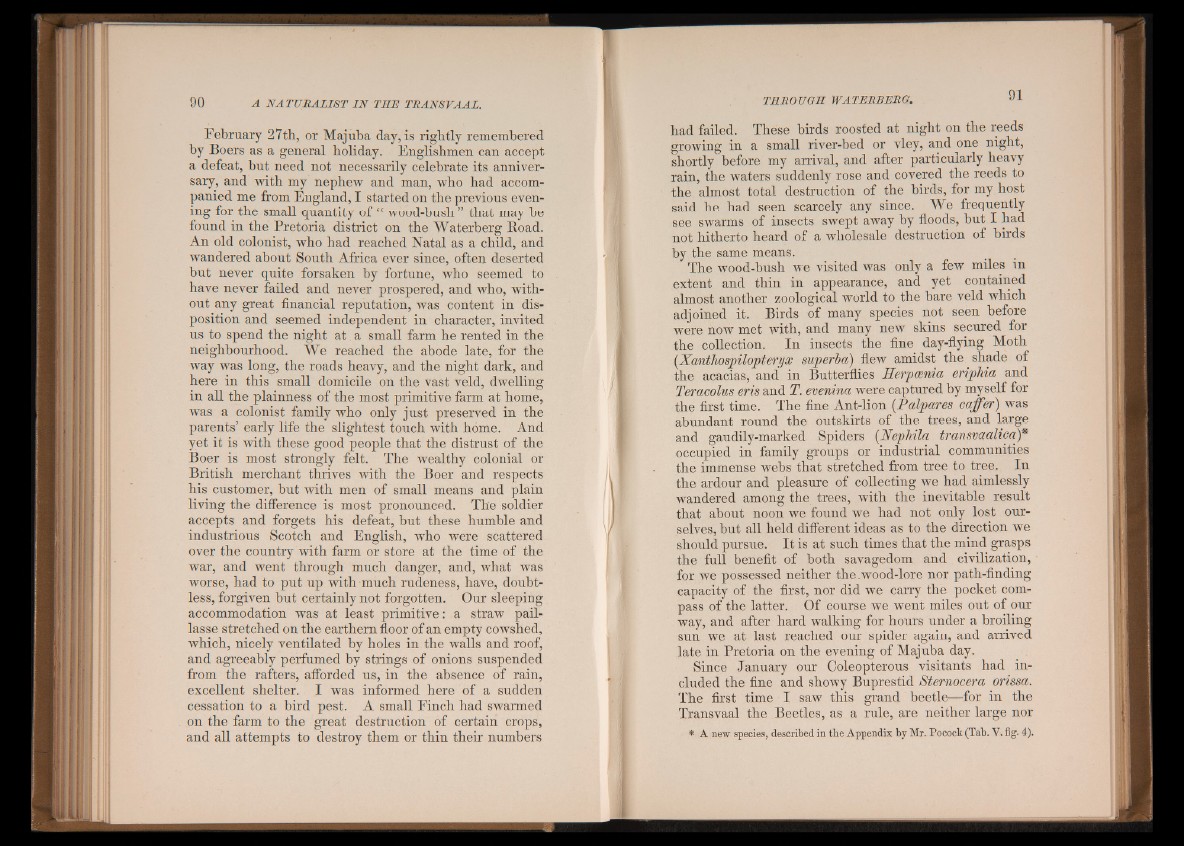
February 27th, or Majuba day, is rightly remembered
by Boers as a general holiday. Englishmen can accept
a defeat, but need not necessarily celebrate its anniversary,
and with my nephew and man, who had accompanied
me from England, I started on the previous evening
for the small quantity of “ wood-bush r that may be
found in the Pretoria district on the Waterberg Boad.
An old colonist, who had reached Natal as a child, and
wandered about South Africa ever since, often deserted
but never quite forsaken by fortune, who seemed to
have never failed and never prospered, and who, without
any great financial reputation, was content in disposition
and seemed independent in character, invited
us to spend the night at a small farm he rented in the
neighbourhood. We reached the abode late, for the
way was long, the roads heavy, and the night dark, and
here in this small domicile on the vast veld, dwelling
in all the plainness of the most primitive farm at home,
was a colonist family who only just preserved in the
parents’ early life the slightest touch with home. And
yet it is with these good people that the distrust of the
Boer is most strongly felt. The wealthy colonial or
British merchant thrives with the Boer and respects
his customer, but with men of small means and plain
living the difference is most pronounced. The soldier
accepts and forgets his defeat, but these humble and
industrious Scotch and English, who were scattered
over the country with farm or store at the time of the
war, and went through much danger, and, what was
worse, had to put up with much rudeness, have, doubtless,
forgiven but certainly not forgotten. Our sleeping
accommodation was at least primitive: a straw paillasse
stretched on the earthern floor of an empty cowshed,
which, nicely ventilated by holes in the walls and roof,
and agreeably perfumed by strings of onions suspended
from the rafters, afforded us, in the absence of rain,
excellent shelter. I was informed here of a sudden
cessation to a bird pest. A small Finch had swarmed
on the farm to the great destruction of certain crops,
and all attempts to destroy them or thin their numbers
had failed. These birds roosted at night on the reeds
growing in a small river-bed or vley, and one night,
shortly before my arrival, and after particularly heavy
rain, the waters suddenly rose and covered the reeds to
the almost total destruction of the birds, for my host
said he had seen scarcely any since. We frequently
see swarms of insects swept away by floods, but I had
not hitherto heard of a wholesale destruction of birds
by the same means.
The wood-bush we visited was only a few miles in
extent and thin in appearance, and yet contained
a lm o s t another zoological world to the bare veld which
adjoined it. Birds of many species not seen before
were now met with, and many new skins secured for
the collection. In insects the fine day-flying Moth
(Xanthospilopteryx superba) flew amidst the shade of
the acacias, and' in Butterflies Eerpcenia eriphia and
Teracolus eris and T. evenina were captured by myself for
the first time. The fine Ant-lion (.Palpares caff ex) was
abundant round the outskirts of the trees, and large
and gaudily-marked Spiders (Nephila transvaalica)*
occupied in family groups or industrial communities
the immense webs that stretched from tree to tree. In
the ardour and pleasure of collecting we had aimlessly
wandered among the trees, with the inevitable result
that about noon we found we had not only lost ourselves,
but all held different ideas as to the direction we
should pursue. It is at such times that the mind grasps
the full benefit of both savagedom and civilization,
for we possessed neither the.wood-lore nor path-finding
capacity of the first, nor did we carry the pocket compass
of the latter. Of course we went miles out of our
way, and after hard walking for hours under a broiling
sun we at last reached our spider again, and arrived
late in Pretoria on the evening of Majuba day.
Since January our Coleopterous visitants had included
the fine and showy Buprestid Sternocera orissa.
The first time I saw this grand beetle—for in the
Transvaal the Beetles, as a rule, are neither large nor
* A new species, described in tbe Appendix by Mr. Pocock (Tab. V. fig- 4).